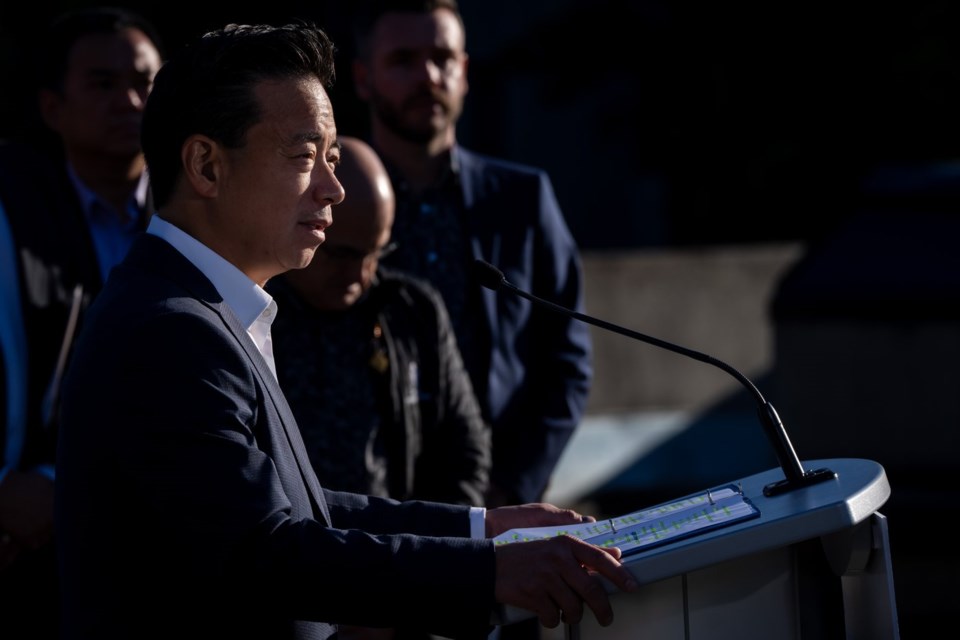VANCOUVER — A proposal by Vancouver's mayor to halt new supportive housing projects in the city has organizations with plans in various stages of completion worried about the projects they've spent years trying to get off the ground.
Mayor Ken Sim announced last month that he would be putting forward a proposal to pause construction of net new supportive housing units in Vancouver, arguing that the city needs to focus on updating its current stock, while supply in other parts of the region increases.
Julie Roberts, executive director of Community Builders, said the low-income housing organization has weekly meetings that include representatives from the city about the design and construction of a 64-unit supportive housing building that is nearly ready to be built after it was approved by council last year.
She said no one has mentioned whether the mayor's plan will allow the project to go ahead.
"We know that there are thousands of people on wait-lists for supportive housing right now. So, whether or not it impacts our project in progress or not, we are concerned that it'll impact not only our organization, but many other people waiting for housing at this time," she said.
Donna-Lynn (Donnie) Rosa, the CEO of Atira, a housing and women's advocacy group, said she's been told that its projects, which include a building that is expected to be occupied this summer and one that is being renovated, are not believed to be at risk, though city staff told her they don't have clear directions yet.
Building new supportive housing is a lengthy, often years-long process of getting funding and the appropriate permits.
No date has been provided for when Sim is expected to put forward his proposal to council.
Rosa said she thinks the key to getting a project completed will be how Sim defines "new" construction and how far into the process a project has to be before it's considered underway enough to continue.
Data provided by BC Housing list 795 supportive housing units "underway" in Vancouver as of the end of September 2024, which covers "any project that is in the planning, proposal or construction phase."
A statement from the City of Vancouver says there are five supportive housing projects with a combined 330 units at various stages of obtaining a development or building permit, and one additional project with 53 supportive units under construction.
The statement says any changes to policy would require direction from city council.
"The City of Vancouver has a clear development permit process, and staff will continue to process applications for social and supportive housing according to existing policies until a council resolution is passed."
Rosa said she's nervous about Sim's plan "on so many levels."
"It's this grand statement that is not going to fix things, and it's going to give permission to others to say, we're going to do the same thing." she said.
She said Sim and others should be reaching out to service providers to understand how to get to the outcome they want.
"Which is not no housing and no services. We want a regional approach, for sure, but you don't just say, 'Well, that's it. I'm taking my ball and going home and you figure out the regional approach.'"
Sim's proposal is part of a plan to revitalize the city's troubled Downtown Eastside. He said in January that Vancouver contains 77 per cent of the region’s supportive housing, despite comprising only 25 per cent of the population.
BC Housing's numbers show 1,825 supportive housing units open in Vancouver and nearly the same number of shelter spaces.
The next closest Metro Vancouver community is Surrey, which has 589 supportive housing units and 80 underway along with 580 shelter spaces.
Seven Metro Vancouver communities are listed as having no open supportive housing units.
"The location of these projects in any community is based on essential factors, including but not limited to local need, available land resources, proximity to necessary amenities, services and transit, and other factors," BC Housing said in a statement.
Roberts is part of a coalition of executive directors that she said have been asking for meetings with city officials to try and get more details on Sim's proposal.
"As individual organizations, as well as a group, we're hoping to seek some clarity on the mayor's announcement. And if there is any way that this can be reconsidered," she said.
Rosa said building supportive housing outside Vancouver is not likely to cause people living in the Downtown Eastside to leave, because supportive housing is needed across the province.
"There are now people in Delta, there are people in Coquitlam, there are people in Richmond who are living hard, who are in need of supportive housing," she said.
"It's not going to disperse people, they're still going to be in the Downtown Eastside. The regional approach means you're actually just going to start to catch up in those outer municipalities where the services haven't been provided."
Rosa said Atira helps about 8,000 people in supportive housing, including some buildings for woman escaping domestic violence, but they turn away about 5,000 people annually.
"You can imagine, you have a place full of women who are fleeing violence, there are mental health issues, whether it's family issues, counselling issues, legal issues, these are the things that we provide support to," she said.
"If we're already busting at the seams, doing less is not actually the solution."
This report by The Canadian Press was first published Feb. 5, 2025
Ashley Joannou, The Canadian Press




